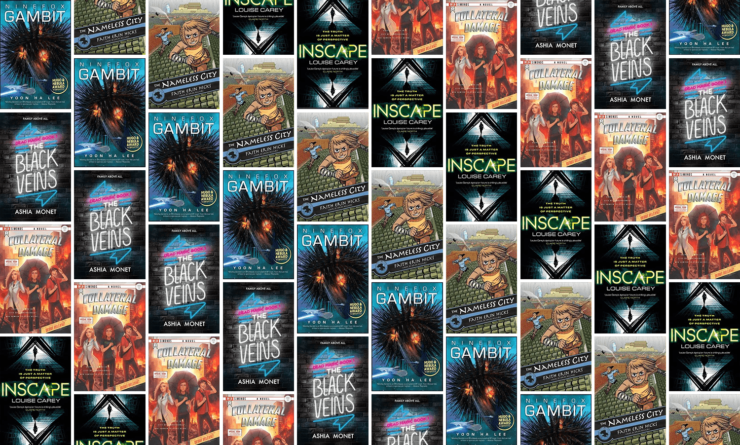As a teen growing up on a steady diet of books, movies, and video games, there was always a certain character dynamic I gravitated toward hard, even though it was an embarrassingly long time before I could pinpoint what exactly it was about it that pushed my buttons so relentlessly. Turns out the answer is simple, even if it’s hard to find: a pure friendship between characters of different genders. Not a friendship that turns into a romance. Not a friendship that exists as a consolation prize for a failed romance or the rejected third of a love triangle. A friendship.
I think where I first came across this was in the movie Aliens, which I saw at the impressionable age of maybe twelve. There was so much I loved about that movie, but the extremely understated relationship between two minor characters—Vasquez and Drake—is what stuck with me. I’m sure a lot of people have shipped them as a couple, but to me their relationship was exactly how it’s shown (albeit minimally) on-screen. They’ve got each other’s backs. They’ve clearly Seen Some Shit™ together. She has to be bodily restrained from diving headlong into certain death-by-xenomorph to rescue him. In short, they’re war buddies. But it’s so rare to see that kind of intimate camaraderie between genders in fiction. Between men: absolutely. (War movies, sports movies, and military SF are full to bursting with them.) Between women: hell yes. (So many all-women found families to choose from. Two of my favorite examples are graphic novel runs: Lumberjanes, which is all-ages, and Rat Queens, which is…not.) But a mixed gender friendship that doesn’t turn into romance? Especially when we’re not being explicitly told that the possibility of romance and/or sex is not an option because one or both characters’ sexualities preclude it? They are ridiculously hard to find.
So, of course, this is the kind of relationship I write into pretty much all my books. Everything I do is about found families and close friendships and the recasting of romance tropes to center intense friendships instead (to date I’ve written slow-burn enemies-to-besties, a friendship triangle, and a hopeless obsessive platonic crush). Because if you can’t find it, write it, you know? Because someone else probably needs that book just as much as you do.
Buy the Book
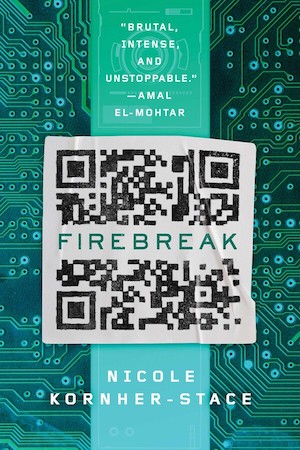

Firebreak
Lucky for me (and now for you), in the course of yelling my head off on Twitter about how badly we need more of these books in the world—not only for aro/ace representation, which I love to see, but also for everyone who values friendship and is tired of the prevalence of “just friends” and “friendzoned” (ugh) in both fiction and the real world, which fiction informs—people have recommended me some.
Here are a few.
Inscape by Louise Carey
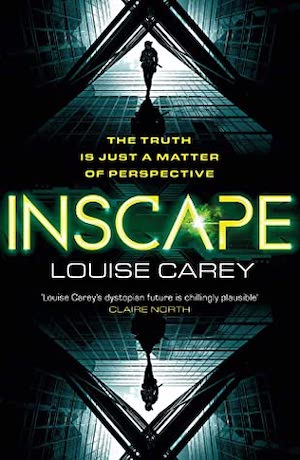
This novel is an absolutely kickass SF cyberpunk techno-thriller that deals with a whole heap of tropes that are catnip to me personally: Black Mirror-esque scary tech, corporate overreach that’s so overreach-y that it’s become the taken-for-granted status quo (they literally own people), child supersoldiers, etc. (Seriously, if you enjoyed any of those in my books, give this one a read, like, yesterday.) It follows Tanta, a soldier owned by the corporation that raised her from childhood, and Cole, a corporate employee with a mysterious past, as they uncover secrets about the company they work for. It’s exactly my kind of thing. But I heard of it because one day out of nowhere people were sending me the link to an interview with the author. I wasn’t sure why multiple people were making sure I saw it, but then I got to the part where Carey says: “Right from the start of planning Inscape, I was interested in exploring a platonic friendship between a man and a woman, and making that the emotional core of the novel. I haven’t seen much focus on relationships like that in the fiction I read, so I wanted to write one myself. Sometimes, I feel like the default assumption in a lot of fiction is that if you throw a male lead and a female lead together, sexual chemistry will be the inevitable result. When I encounter that attitude in a story, I find it wearing, because there are so many other rich, complex and interesting ways for men and women to interact!” And then it made a lot of sense. Tanta and Cole are a delight. If you want to see a professional relationship/forced alliance turn into a friendship and not a romance (or if you, like me, lost your shit when Mako Mori and Raleigh did not kiss at the end of Pacific Rim), give Inscape a read for sure.
The Nameless City by Faith Erin Hicks
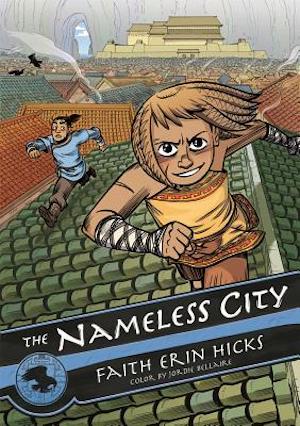
This is the all-ages, fantasy, sweeping epic graphic novel trilogy of your dreams. It’s about a city at war, named and renamed over the years by each invading army that conquers it, and the powderkeg tension between the latest invading force and the people who are just trying to survive in the city where they’ve always lived, no matter who’s flying their flag over it currently. The story follows Kaidu, a child of invaders, and Rat, whose parents were killed in the invasion. But it’s about the blossoming friendship between them, and over the course of three books they do not become a couple. This is maybe particularly stunning given their age—YA is crammed full of M/F friendships that pivot out of nowhere into romance for no apparent reason—but at any age Kaidu and Rat would still be a breath of fresh air. The concept art in the backs of the books is full of depictions of platonic intimacy (!!!) in which they are up in each other’s personal space in a way that is close as hell and yet never shown as romantic. At one point they’re holding hands! But we’re never told they’re anything but friends. (Bonus points here: they’re not friends because they’re not romantically/sexually compatible, at least not that we’re told. They’re friends because they enjoy each other’s friendship.) I do wish some of that concept art would have made it into the final story, but it’s in the books so it’s canon and I’m taking the win.
The Black Veins by Ashia Monet
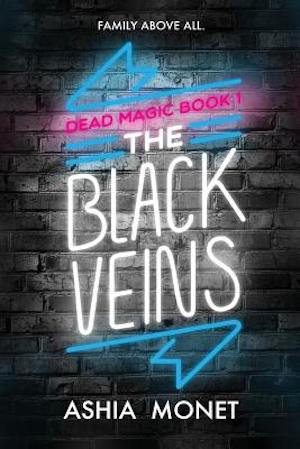
The Black Veins isn’t so much about a character pairing as it is about a found family of teens who really have to grow into each other’s friendship in order to go on a monster-slaying epic rescue road trip without annoying each other to death, and it’s very, very refreshing. On the surface the characters look like stereotypes—the Rich Girl, the Shy Boy, the Sarcastic Protagonist, the Hot Guy, etc.—but don’t fall for it! They’re all nuanced and wonderfully written with great character growth. If you’ve been looking for a Magical Teens in a Magical Society book that is written by an indie Black author instead of a zillionaire TERF and is full of all kinds of genuine character diversity and laugh-out-loud humor and queerness everywhere and just a ton of heart, this is the book for you. So many friendships among characters of all genders. Beyond one very flirty character who appears late in the story, there’s no hint of romance or sexual tension anywhere.
Collateral Damage by Taylor Simonds
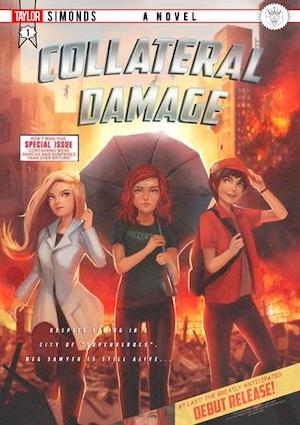
This is another found-family story, but the heart of it is the entirely adorable ride-or-die friendship between Meg and Oliver. They save each other’s lives more than once—I don’t want to spoil anything but they absolutely have each other’s backs amid Bad Shit, but they’re also a couple of goofy teenagers who hang out and watch bad movies while eating raw cake batter out of the bowl on the floor of Meg’s crappy apartment. With absolutely zero hint of romance, sexual tension, nothing. They’re best friends. Period. Even apart from their amazing friendship, this book is too much fun for its own good. It asks the question: sure, having superheroes watch over your city sounds cool, but what would that be actually like? And the answer is: awful. It would be awful. It’s like: what if The Boys, but wholesome. No, seriously. Read it.
Ninefox Gambit by Yoon Ha Lee
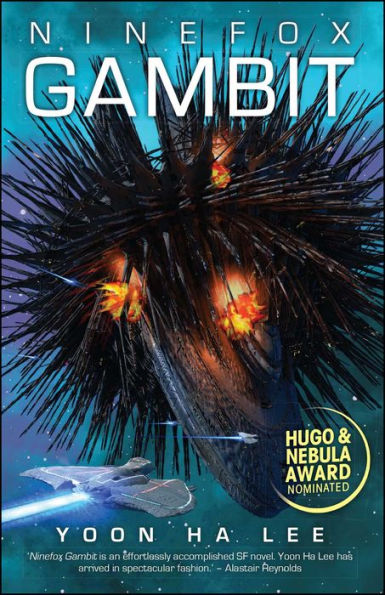
…Listen, I know what you’re thinking. But is it a friendship, Nicole. Is it really. And the answer is…maybe not? Not in the traditional sense anyway. Cheris and Jedao feel to me like Furiosa and Max in Fury Road, which is to say: an Unlikely Alliance, First Based on Necessity, Then Mutual Respect—and I could count on the fingers of one hand the number of fictional M/F relationships I can think of that didn’t start out like this and then turn into romance at the end. What made me absolutely want to include Ninefox Gambit on this list, though, is that you don’t get a whole lot more intimate than bodysharing, and that’s what Cheris and Jedao have to do. He literally lives in her mind. She casts his shadow. His reflection is in her mirror. The low-hanging plot fruit here would be to give this some kind of sexy vibe, but this absolutely does not happen and I adore every single micron of print in which it fails to occur.
Tell me about the ones I left out! I’d love to read them. And if you’re writing this type of character pairing, don’t listen to people who tell you your book “needs to” have a romance in order to be “relatable.” Real-world relationships have so much more variety than we tend to see depicted in our fiction, and it’s beyond time for fiction to catch up.
Nicole Kornher-Stace is the author of the Norton Award finalist Archivist Wasp and its sequel, Latchkey. Her short fiction has appeared in Clarkesworld, Apex, and Fantasy Magazine, as well as many anthologies. She lives in New Paltz, New York, with her family. She can be found online at her website, or on Twitter @WireWalking.










